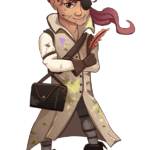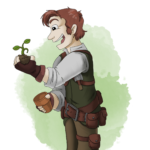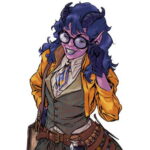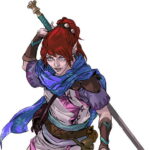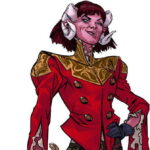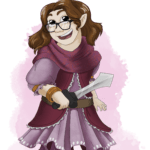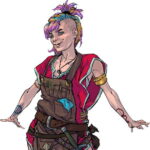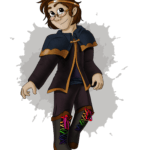Professor Onyx
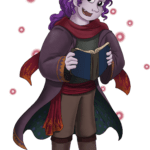
Professor Onyx (Monk)
Medium Humanoid (Tiefling), Lawful Good
Nonbinary (they/them)
Armor Class: 13
Hit Points: 33
Speed: 40 ft.
| Strength | Dexterity | Constitution | Intelligence | Wisdom | Charisma |
| 12 (+1) | 12 (+1) | 12 (+1) | 18 (+4) | 14 (+2) | 8 (−1) |
Skills: History +7, Religion +7, Arcana +4, Investigation +4
Senses: Passive Perception 12, Darkvision 60 ft.
Languages: Common, Infernal
Challenge: 5
Abilities
Ki. They can harness the mystic energy of ki. They have five ki points with a DC 13 ki save.
Martial Arts. They gain the following benefits while they are unarmed or wielding only monk weapons and they aren’t wearing armor or wielding a shield:
They can use Dexterity instead of Strength for the attack and damage rolls of their unarmed strikes and monk weapons.
When they use the Attack action with an unarmed strike or a monk weapon on their turn, they can make one unarmed strike as a bonus action. For example, if they take the Attack action and attack with a quarterstaff, they can also make an unarmed strike as a bonus action, assuming they haven’t already taken a bonus action this turn.
Deflect Missiles. They can use their reaction to deflect or catch the missile when they are hit by a ranged weapon attack. When they do so, the damage they take from the attack is reduced by 1d10 + 6.
If they reduce the damage to 0, they can catch the missile if it is small enough for them to hold in one hand and they have at least one hand free. If they catch a missile in this way, they can spend 1 ki point to make a ranged attack with the weapon or piece of ammunition they just caught, as part of the same reaction. They make this attack with proficiency, regardless of their weapon proficiencies, and the missile counts as a monk weapon for the attack, which has a normal range of 20 feet and a long range of 60 feet.
Flurry of Blows. Immediately after they take the Attack action on their turn, they can spend 1 ki point to make two unarmed strikes as a bonus action.
Infernal Legacy. They know the Thaumaturgy cantrip. They can cast the Hellish Rebuke spell as a 2nd-level spell once and the Darkness spell once with this trait and regain the ability to do so when they finish a long rest. Charisma is their spellcasting ability for these spells.
Patient Defense. They can spend 1 ki point to take the Dodge action as a bonus action on their turn.
Slow Fall. They can use their reaction when they fall to reduce any falling damage they take by 25.
Step of the Wind. They can spend 1 ki point to take the Disengage or Dash action as a bonus action on their turn, and their jump distance is doubled for the turn.
Stunning Strike. They can interfere with the flow of ki in an opponent’s body. When they hit another creature with a melee weapon attack, they can spend 1 ki point to attempt a stunning strike. The target must succeed on a Constitution saving throw or be stunned until the end of their next turn.
Traits
Sensory Processing Difference (Sensory Under-Responsivity: tactile and auditory) [IE 1, Chronic]. Onyx has difficulty detecting tactile and auditory sensory input, causing them some difficulty with coordination and their awareness of the volume at which they are speaking. Due to this they take a −1 penalty to Wisdom (Perception) rolls involving these senses. Additionally, they take a −1 penalty to all Dexterity ability checks and a +1 bonus to rolls to resist pain or torture in addition to resistance to psychic damage.
Social Interaction Difference [Impact Extent 2, Chronic]. They have trouble interpreting the social aspects of language, both verbal and non-verbal, and the feelings being conveyed. This can make them seem insensitive as they miss sarcasm, avoid eye contact, take expressions literally, or don’t attend to the subject as neurotypical people would expect, or they tend to repeat phrases spoken to them as they process them. They have a −(IE) penalty on Charisma (Persuasion) and Charisma (Deception) and Wisdom (Insight) checks. They can use Masking to mitigate these effects.
Special Interest (Cooking) [IE 2, Chronic]. Due to Professor Onyx’s special interest in cooking, they gain a +2 bonus on checks related to identifying food, how it is made, and the cultural background of the food item itself. However, they will often try to turn conversations towards the subject of cooking, despite the desires of their conversation partner(s). Onyx must succeed on a DC 10 Charisma saving throw to avoid attempting to shift the subject of discussion to cooking.
Actions
Extra Attack. They can attack twice, instead of once, whenever they take the Attack action on their turn.
Quarterstaff. Melee Weapon Attack: +4 to hit, reach 5 ft., one target. Hit: 4 (1d6 + 1) or 5 (1d8 + 1) bludgeoning damage.
Unarmed strike. Melee Weapon Attack: +4 to hit, reach 5 ft., one target. Hit: 4 (1d6 + 1) bludgeoning damage.
Background
Professor Onyx lovingly teaches at a secret monastery for monk disciples. The professor takes great pride in preparing their students for the world. Professor Onyx holds vast knowledge in an array of disciplines, including history, both ancient and contemporary; religion; and the arcane arts. Many students will struggle at first with Professor Onyx’s way of interacting with them due to the professor’s high energy and rapid-fire speech, however, students soon discover that Onyx is not attempting to berate them with knowledge or superiority, but rather shares this information out of a genuine love of teaching and learning.
Before joining the monastery, Onyx traveled alone, collecting information, folklore, and rumors about various parts of the world. The professor enjoyed meeting a diverse collection of individuals and an expanding sense of what the world could be. Onyx grew up in a small village where much hate was directed towards anyone different, themself included. While Onyx thrived for many years navigating this environment and were well respected by their peers, eventually Onyx needed a change of pace, becoming more flustered, overwhelmed and generally exhausted by all the changes and experiences. Having heard of the monastery and what it offered, Onyx sought it out with the hope of shaping new minds and reducing the fear and hate of other cultures.
Personality
Generally an outgoing social person, Onyx struggles to read social cues, such as telling when others are not interested in learning something or may not have time right now in the moment due to other pressing matters. Additionally, the professor often gets caught up in the semantics of language and whether things make rational sense. This can lead to Professor Onyx appearing argumentative; however, they view this as a fun game to be played among peers and friends to see who is right. However, Onyx, upon realizing they have made someone uncomfortable, will quickly apologize and move on.
When it comes to their students, Onyx has been known to be extra kind and comforting to anyone they pick up on as having a hard time. The professor will invite them for tea with baked sweets made from scratch. For those who do not have family to visit on holidays, Professor Onyx will cook a feast with many amazing dishes from around the world. As a lover of food, Onyx will share what is in each dish and the history behind it. Through this, the professor monk has been able to impact the lives of many students beyond the classroom.
Plot Hooks
- The party needs to collect information on a culture, history, or religious group they are unfamiliar with.
- A party member needs a sympathetic person to listen to them and help mentor the PC towards growth.
- The party needs to seek refuge away from the world and time to heal.
